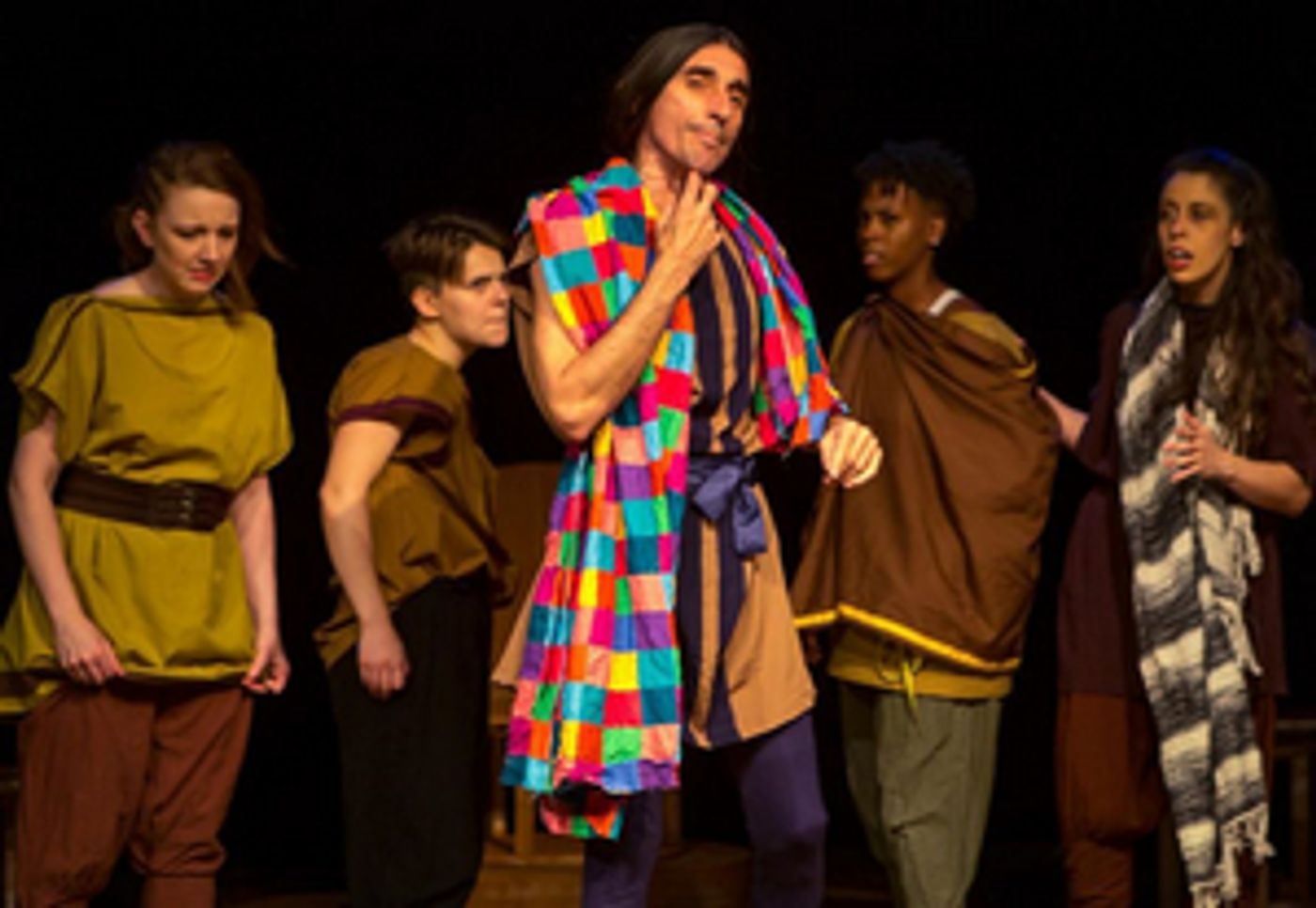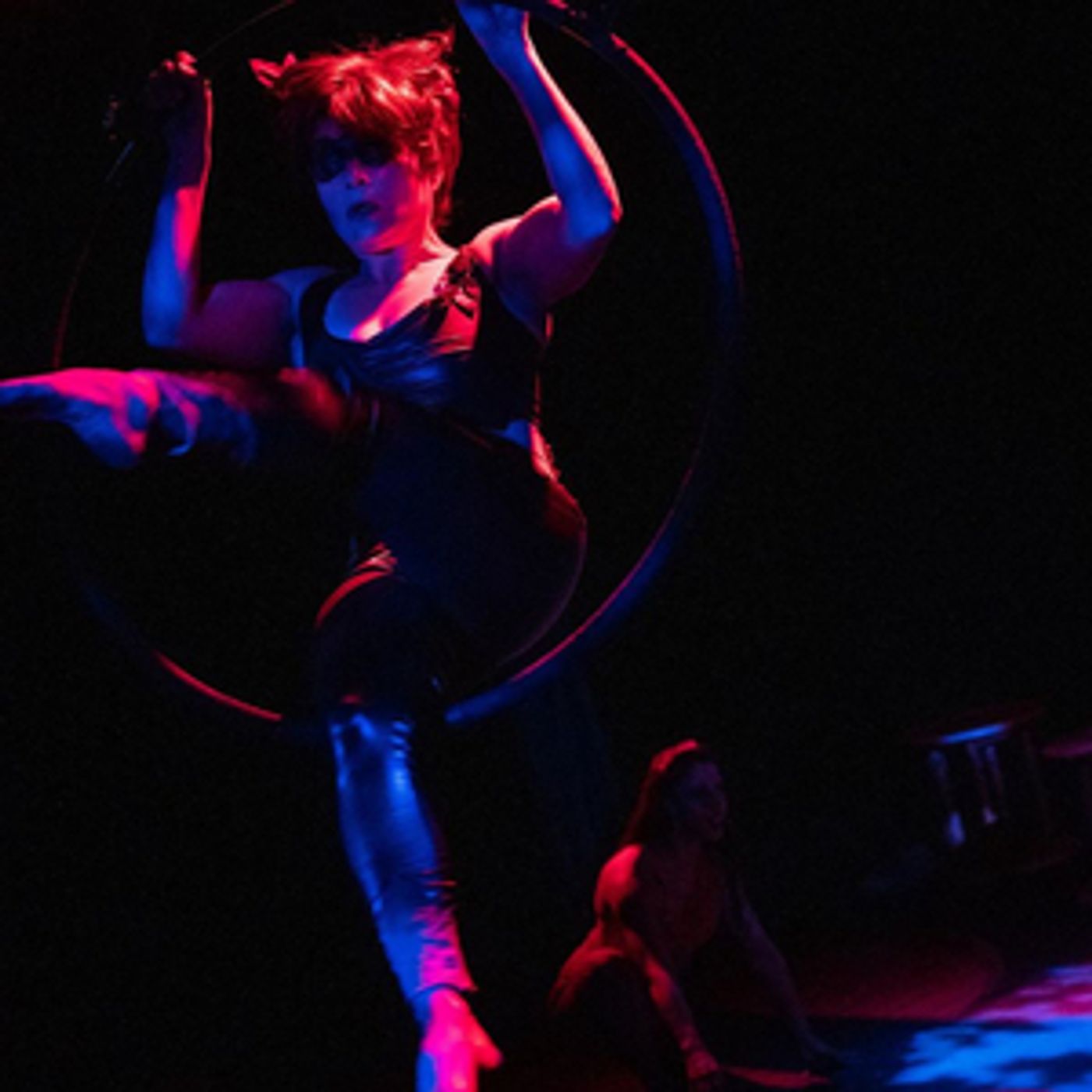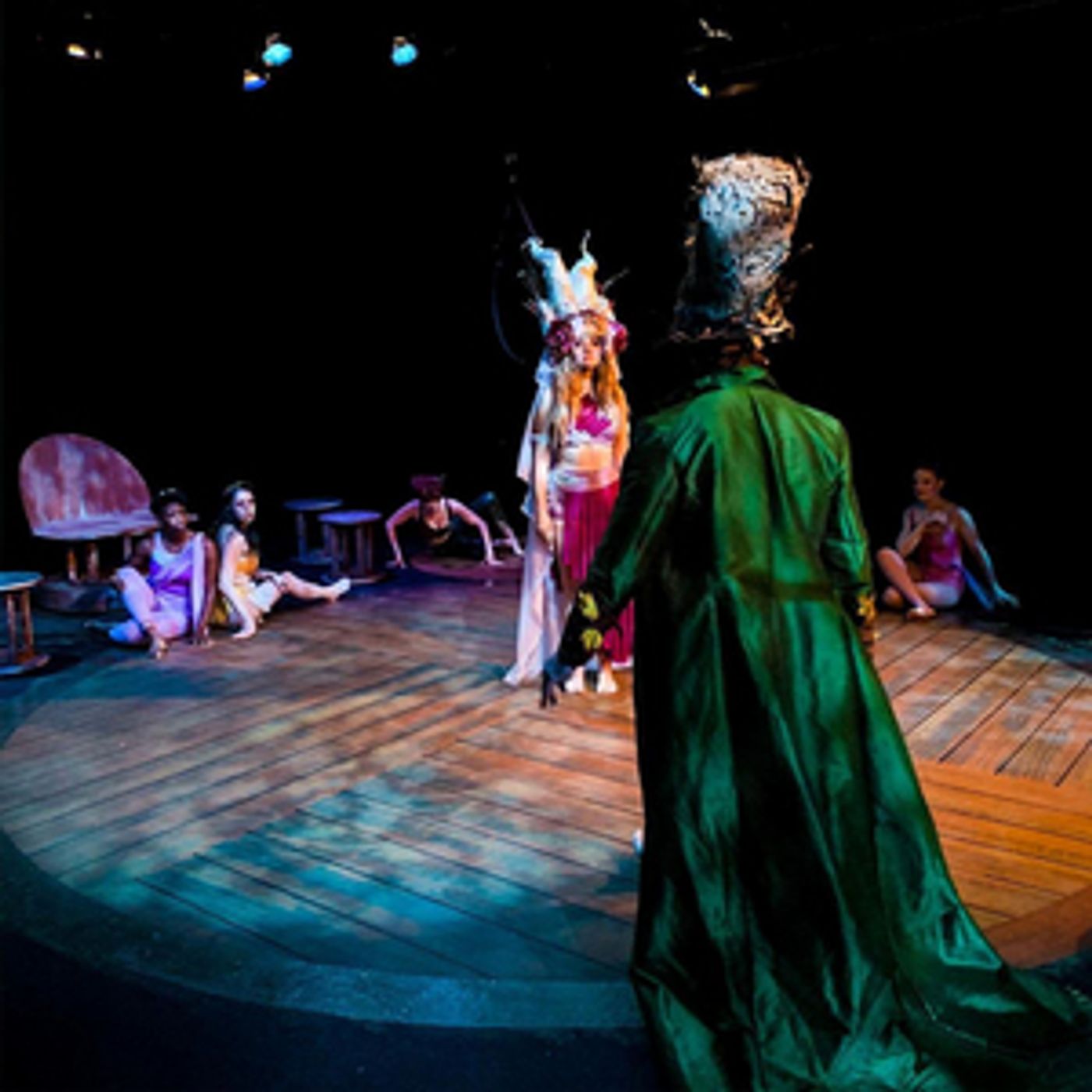Review: Jobsite Theater's Joyous, Hilarious Production of Shakespeare's A MIDSUMMER NIGHT'S DREAM at the Shimberg Playhouse



"I have had a most rare vision. I have had a dream, past the wit of man to say what dream it was. Man is but an ass, if he go about to expound this dream..." --Bottom in A MIDSUMMER NIGHT'S DREAM
"Lord, what fools these mortals be!" --Puck
Any production of A MIDSUMMER NIGHT'S DREAM is a cause for celebration, but the current Jobsite production of William Shakespeare's most popular and beloved work is especially the case. You leave the theatre beaming, unable to wipe the smile off your face. You replay scenes in your head--aerial wonders to a thumping 80's beat; a particularly robust (and hilarious) Pyramus and Thisbe; odd indescribable head pieces that you never thought you'd see in your waking life--and you just find yourself grinning. It's like being on some mood-altering drug--Theatrical Ecstasy.
Jobsite Theater's latest Bard dive may be the company's best yet. Last year's Othello was their biggest seller to date, and I think when word spreads about this joyous MIDSUMMER NIGHT'S DREAM, Puck and company will give the Moor a run for his money. There's a timelessness about this production, a weightlessness; it's fast-paced, yet it also seems to float (at times literally). It's all over the place, and I think that's what I love most about it. It tries everything, and if there's an overall criticism to sling at the show, it's that some of it may be too much of a good thing. Like Lucky Charms cereal with only marshmallows in the box, or Oreos that are all stuffing and no cookie.
The show starts with a blast of Jeremy Douglass' pulsating music. I immediately felt that I was thrust into some 1980's nightclub that only plays the Motels or Berlin. Four of the performers float above the audience, twisting on rings and drapes that hang from the ceiling. It's hypnotic to watch, a Fellini-esque dreamland. (Seeing this production on the 100th anniversary of Federico Fellini's birth added to my awe.) We then watch A MIDSUMMER NIGHT'S DREAM'S interwoven three sequences--young lovers running away, into the woods; "mechanicals" practicing a ridiculous show; and the mischievous denizens of Fairyland. It's beyond hilarious, the perfect antidote to these troubled times.
This sumptuous production features some of our area's finest actors, all of them doing some of their strongest work.
Katrina Stevenson's dynamic Puck is beautifully realized. With hair like a member of the 80's group the Romantics, looking like part Sanda from War of the Gargantuas, part Reema Ruspoli from the Duran Duran "Rio" video, Stevenson cackles, crouches, springs in the air, hovers upside down. She is twirling in the air, delivering her lines without missing a beat, and it's an incredible physical feat to watch. It's like Shakespeare as an Olympic sporting event. My only qualm is that, with her in the air delivering her lines, sometimes we miss Puck's connection and direct interplay with Oberon.
Who is Shakespeare's most engaging rogue--Falstaff or Bottom? Falstaff may be my personal all-time favorite, but in the hands of the incomparable Giles Davies, Bottom is moving on up the ladder in my heart. I first saw Davies in a fine version of A MIDSUMMER'S NIGHT DREAM at freeFall almost a decade ago. He played a rather robust Puck back then, and he was the most reptilian, physical Robin Goodfellow I could ever imagine. And now he plays a completely different soul--a rude mechanical ham who wants to play every part in a play that is "tedious and brief" with "very tragical mirth," Pyramus and Thisbe. Even more than Puck, Bottom is the heart and soul of A MIDSUMMER NIGHT'S DREAM--he is the only human being in the play who gets to experience both human and fairy worlds.
Whenever Davies enters the stage, it bursts with life and energy. He can incite giggles by a mere look. Near the end of Act 1, Bottom turns into a donkey. Davies doesn't overdo it here, and his donkey-laugh is not too much and not too subtle; it's just hilariously right. And the Bottom-as-Pyramus's death scene, in the play within the play that ends A MIDSUMMER NIGHT'S DREAM (the funniest scene you will experience all year; I can't imagine one beating it, even this early in 2020), had me laughing out loud. If I had been drinking milk, it would have been spurted out of my nose. Bottom violently stabs and stabs himself, putting his sword through his own head and even his mouth; it's over the top and glorious. Rarely have I laughed so much at death.
Aside from Davies' Bottom, my pick for best in the cast goes to Martin E. Powers as a Flute unlike any I've ever encountered. He makes a simple line--"I have a beard coming"--into a laugh riot by mere inflection and a perfect pause. As Thisbe in the play within the play, Powers does something that left me breathless: It's a laugh riot at first, and then suddenly, Powers' Flute drops the façade and recites the lines seriously, a moment of pause in this crazy world. I thought this was brilliant because the play within a play mirrors an alternative take on the young lovers' plot in A MIDSUMMER NIGHT'S DREAM--if it had ended in tragedy and not in joyous marriage. It's a stunning instance on Powers' part, and one that makes complete sense in the context of the show.
Cornelio Aguilera as the put-upon Peter Quince is hilarious, right down to his bopping, shuffling feet. (Aguilera also portrays Egeus, Hermia's strident dad, and donning a really bad grey wig, looks like a mustachioed Mrs. Bates.)
The mechanicals who put on the play within the play (most of whom also portray the aerial fairies) are played by performers who are aerialists first, actors second. And they are a charming lot. Kasondra Rose plays an adorable Snug the Joiner, whose IQ is so low it probably can't be measured, and Nancy Mizzel is quite funny as Starveling. Adriana Corso has my vote for smile of the year, and as Wall, she even manages a Senor Wences allusion that had me in stitches.
The young lovers are a hoot of a different kind. The best of them is Patrick A. Jackson as the most energetic Lysander I've seen. His transformation--from loving Hermia to falling head over heels for Helena due to Puck's potion--becomes the stuff of comic gold. His rival, Demetrius, who's a bit of a clod, is well-played by Matt Acquard, who earns plenty of laughs. Sadie Lockhart, as Hermia, is nothing short of sensational. Her frustration when the world goes mad around her, and she feels spurned by her lover, feels quite real. And the multi-talented Kara Sotakoun, as Helena, is quite strong. That said, I feel Ms. Sotakoun is too beautiful for the part of Helena, who should come across as gawky, tall, and unsure of herself. But the actress sometimes seems too forceful, and there should be more of a contrast between her and Hermia.
I also wish that the lovers' big fight scene had been more physical. It's funny as it stands, but I just thought that this group is so good that it could be even more, with bodies falling over themselves in an actual fight. Things are so physical in the air in this production; I just wished they were that crazily physical on the ground too.
Adam Workman and Haley Janeda round out the cast playing double duty as, respectively, Theseus/Oberon and Hippolyta/Titania. They both do well in separating the two parts and carrying the show on their solid shoulders.
Jeremy Douglass' music becomes its own character. It's like something out of a Trent Reznor dreamscape. Sometimes one of the fairies would be singing into a flower microphone, a perfect David Lynch touch (think of Dean Stockwell mouthing Roy Orbison in Blue Velvet). The fairy lullaby, words straight from Shakespeare, had a more 90's sensibility, a slight Cranberries feel to it, at least to me. Two other numbers were performed in a similar fashion (but not with Shakespeare's words), including a sensationally warped version of The Wizard of Oz's "You're Out of the Woods" that caught me off-guard. The thrilling trance-like music is so strong that Mr. Douglass should sell it as a soundtrack album.
Brian Smallheer's minimal set is otherworldly--like The Secret Garden meets The Magic Show. Katrina Stevenson's costumes are marvelously and appropriately colorful, lively and odd. Spencer Meyer's head pieces are bizarre sights to behold, like something worn by the potion-drinkers in Kenneth Anger's Inauguration of the Pleasure Dome (even Smallheer's ethereal lighting is similar to that film). Imagine a Carmen Miranda-like head piece as created by Yves Tanguy, and you'll get an idea of Meyers' special brand of creative genius. They are otherworldly, both primitive and alien; are we in hell or are we in heaven? But I'm not thrilled with Bottom's donkey head. I understand they wanted to create something that didn't obscure Giles Davies' face and brilliant reactions--something that gave the idea of a donkey--but Davies is so good an actor that we can sense all of that just by his astounding voice and body movements. He makes it work here, but the donkey head looks peculiar, like an unfinished prop from a roadshow of Equus.
The real star of this winning production is director David Jenkins. This is some of his finest work, and his cast more than step up to the occasion. Watching the performance was like being immersed in a bath of pure joy.
A MIDSUMMER NIGHT'S DREAM is a fast two hours, twenty-two minutes. You certainly get your money's worth and then some. Shakespeare wrote the play nearly 430 years ago, and yet is still seems so cool, so alive, so new. It's like having your favorite dream sprung to life, and you never want to see it end.
Jobsite Theater's A MIDSUMMER NIGHT'S DREAM runs thru February 16th at the Shimberg Playhouse at the Straz Center for the Performing Arts. If their previous Shakespeare plays are any indication, you better get your tickets now because they tend to sell out rather quickly.
Reader Reviews
Videos

